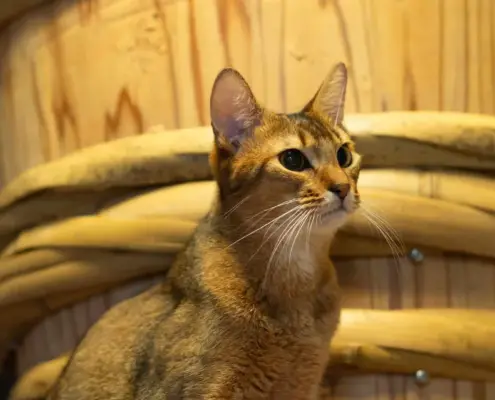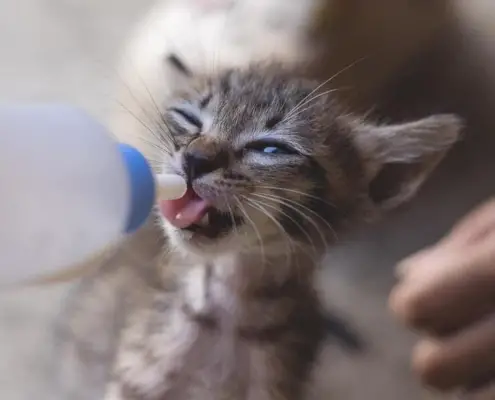
Cats, like humans and other animals, can be prone to various health conditions, some of which are caused by genetic factors. Genetic diseases in cats are inherited disorders that result from abnormalities or mutations in their genes. These conditions can range from mild to severe and can affect various aspects of a cat’s health, including their immune system, metabolism, and organ function. Understanding genetic diseases in cats is crucial for pet owners, breeders, and veterinarians to provide the best care and support for our feline companions.
Genetic diseases can be categorized into different types, such as autosomal dominant, autosomal recessive, or X-linked recessive, depending on the specific gene involved. Some genetic diseases in cats are breed-specific, while others can affect cats of any breed or mix. It’s important to note that not all cats with genetic mutations will develop a disease. Some cats may be carriers of these mutations without showing any symptoms themselves. However, when two carrier cats mate, there is a risk of their offspring inheriting the disease.
Common genetic diseases in cats
There are several genetic diseases that commonly affect cats. One such disease is polycystic kidney disease (PKD), which is a common inherited disorder in Persian and Exotic Shorthair cats. PKD causes the formation of fluid-filled cysts in the kidneys, leading to kidney failure over time. Another prevalent genetic disease is hypertrophic cardiomyopathy (HCM), which affects the heart muscles and can lead to heart failure. HCM is commonly seen in Maine Coon and Ragdoll cats.
In addition to PKD and HCM, other genetic diseases in cats include progressive retinal atrophy (PRA), a degenerative eye disorder that can lead to blindness, and feline infectious peritonitis (FIP), a fatal viral disease caused by a mutation in the feline coronavirus. Cats with FIP may experience symptoms such as fever, weight loss, and fluid accumulation in the abdomen or chest.
Understanding the role of genetics in feline health
Genetics play a vital role in feline health, as they determine the traits and characteristics of cats, including their susceptibility to certain diseases. Genes are segments of DNA that provide instructions for the development and functioning of the body. When there is a mutation or abnormality in a gene, it can disrupt the normal processes and lead to the development of genetic diseases.
It’s important to note that not all genetic diseases are solely determined by genetics. Environmental factors, such as diet, exposure to toxins, and stress, can also influence the expression and severity of genetic diseases in cats. Additionally, genetic diseases can have variable penetrance, meaning that not all cats with the same mutation will exhibit the same symptoms or develop the disease to the same extent. This complexity makes it crucial to understand the underlying genetics and factors contributing to feline health conditions.
Genetic testing for cats
Genetic testing has become an invaluable tool in identifying and managing genetic diseases in cats. Through genetic testing, veterinarians and breeders can determine if a cat carries a specific mutation associated with a particular disease. This information is crucial for breeding programs to prevent the transmission of genetic diseases to future generations.
There are various types of genetic tests available for cats, including DNA tests that can detect specific mutations linked to certain diseases. These tests can be performed using a simple blood sample or cheek swab, making it relatively easy and non-invasive. Genetic testing can help identify carriers, affected cats, and clear cats (those without the mutation), allowing breeders to make informed decisions to reduce the prevalence of genetic diseases.
Breeding considerations to prevent genetic diseases
Breeders play a critical role in preventing the spread of genetic diseases in cats. By understanding the inheritance patterns and genetic risks associated with specific breeds, breeders can make informed decisions to minimize the occurrence of genetic diseases in their breeding programs. Responsible breeders should prioritize the health and welfare of their cats by screening for genetic diseases and avoiding breeding cats that carry or are affected by these conditions.
In some cases, outcrossing or introducing new bloodlines into a breeding program can help reduce the risk of genetic diseases. This approach can increase genetic diversity and minimize the chance of inheriting harmful mutations. However, it’s essential to strike a balance between genetic diversity and maintaining breed standards to preserve the unique characteristics of each breed.
Managing and treating genetic diseases in cats
While genetic diseases cannot be cured, various management and treatment options are available to improve the quality of life for affected cats. Treatment plans may involve medications, dietary modifications, and supportive care to address the specific symptoms and complications associated with each genetic disease.
For example, cats with PKD may require medications to manage high blood pressure and supportive care to maintain kidney function. Cats with HCM may benefit from medications to regulate heart rhythm and prevent blood clots. Regular veterinary check-ups and monitoring are essential for cats with genetic diseases to detect and address any changes or complications promptly.
Resources for genetic disease information and support
Pet owners and breeders can find valuable resources and support for genetic diseases in cats. Veterinary geneticists and specialists can provide expert advice and guidance on genetic testing, breeding strategies, and management of genetic diseases. Additionally, there are online databases and registries available that compile information on specific genetic diseases in various cat breeds.
It’s also essential for cat owners to connect with reputable breeders who prioritize genetic health and are transparent about genetic testing and the prevalence of genetic diseases in their breeding lines. By working together and sharing knowledge, we can collectively contribute to the betterment of feline health and the prevention of genetic diseases.
Promising research in feline genetics
Advancements in feline genetics research offer hope for the future. Scientists and researchers are continually uncovering new insights into the genetic basis of various diseases in cats. This knowledge can lead to the development of innovative diagnostic tools, treatment options, and preventive measures.
One area of research focuses on gene therapy, which involves delivering healthy copies of genes into the cat’s body to replace the defective ones. Gene therapy holds promise for treating genetic diseases by correcting the underlying genetic defects.
Additionally, ongoing research aims to identify and understand the genetic risk factors for various diseases, enabling early detection and intervention. This knowledge can help veterinarians and breeders implement proactive measures to prevent the onset or progression of genetic diseases.
The future of genetic testing and treatment for cats
As technology continues to advance, genetic testing and treatment options for cats are expected to improve. More comprehensive genetic panels can be developed to screen for a wide range of genetic diseases, allowing for more accurate and efficient testing.
Furthermore, advancements in gene editing technologies, such as CRISPR-Cas9, offer potential for precise genetic modifications. This technology holds promise for correcting genetic mutations in cats, potentially eliminating the risk of passing on genetic diseases to future generations.
With continued research and collaboration between scientists, veterinarians, and breeders, the future of genetic testing and treatment for cats looks promising. It is an exciting time for feline genetics, and the knowledge gained will undoubtedly contribute to the overall well-being of our beloved feline companions.
Conclusion
Understanding the genetics of feline health and genetic diseases is of utmost importance for pet owners, breeders, and veterinarians. By recognizing the common genetic diseases in cats, utilizing genetic testing, and making informed breeding decisions, we can work towards reducing the prevalence of these diseases and improving the overall health of cats. Promising research in feline genetics offers hope for more effective diagnostic tools, treatment options, and preventive measures in the future. Let us embrace the power of genetics to unravel the mysteries of feline health and provide our furry friends with the best care possible.
If you have any concerns about your cat’s health or suspect a genetic disease, consult with a veterinarian who specializes in feline genetics for guidance and support. Remember, early detection and intervention can make a significant difference in managing genetic diseases and improving the quality of life for your cat.
If you enjoyed my article, I would appreciate you sharing it with your network.

Sima Ndlebe
Sima writes for CatBuzz. He is interested in Cats, Health and Fitness, and Entrepreneurship.
Published: 1 November 2023
Related Articles
Disclaimer
The content found on CatBuzz.org is presented on an "as is" basis and is intended for general consumer information and education purposes only. Any utilization of this information is voluntary and solely at the user's own risk.
None of the articles or content should be regarded as, or used in place of, veterinary medical advice, diagnosis, or treatment. The information provided on the website is purely for educational and informational intentions and should not be considered a substitute for professional guidance from a veterinarian or other qualified expert. The articles are designed to inform consumers about veterinary healthcare and medical matters that may impact their cat's daily life. It should be noted that this website and its services do not constitute the practice of any form of veterinary medical advice, diagnosis, or treatment. CatBuzz.org explicitly disclaims any liability for any direct or indirect damages or losses that may arise from the use of or reliance on the information contained within the content.
Consumers must consult a veterinarian, veterinary specialist, or another qualified veterinary healthcare provider when seeking advice regarding their cat's health or medical conditions. It is important not to ignore, avoid, or postpone seeking medical advice from a veterinarian or other qualified veterinary healthcare provider solely based on information obtained from this website. If you believe that your cat may be experiencing a medical issue or condition, it is imperative to promptly contact a qualified veterinary healthcare professional.



